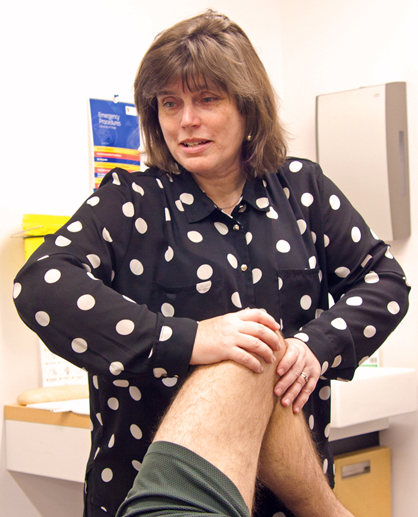Physiotherapist and researcher
The modest farming township of Ranfurly in Central Otago now offers a decent espresso stop on route to New Zealand's Southern Lakes.
When ex-Londoner Cathy Chapple arrived in 1992, life was more 'hard-edged' in Otago's rural hinterland.
 Having crisscrossed the globe after graduation and worked throughout the UK and Australia, she found clinical conditions in small-town New Zealand a far cry from London, and the diverse workload rewarding.
Having crisscrossed the globe after graduation and worked throughout the UK and Australia, she found clinical conditions in small-town New Zealand a far cry from London, and the diverse workload rewarding.
Always ready for new experiences, Cathy soon grew to love her role as a physiotherapist at the small Maniototo Hospital in Ranfurly.
The rural town's relative isolation and often severe winters challenge medical staff and their patients.
While New Zealand's expanding rural workforce increases demand for services, persistent staff shortages often oblige teams of health professionals to do more with less.
New career directions
She found working with clinical teams in the hospital setting satisfying and this soon compelled Cathy to focus her efforts in a larger centre and she chose to make her home in Dunedin.
At Dunedin Hospital Cathy worked with a team of orthopaedic specialists before diverting to the outpatient area.
“We were able to create 'windows' of opportunity for more outpatients to engage with their own rehabilitation, and in the course of that, to be better able to look after themselves over the longer term”
Working in a busy public hospital environment with those living with chronic pain and joint conditions such as osteoarthritis, or OA, proved a reminder of the fact that many psychosocial factors affect those with ongoing health conditions. These experiences prompted her to define her clinical speciality as musculoskeletal physiotherapy.
Cathy also began to question issues of equity, fairness and access to physiotherapy services for the majority of those in need of physiotherapy care.
Diverse leadership and management roles in the hospital setting enabled her to extend the focus onto staff and service development, helping to address some of these inequities.
“We were able to create 'windows' of opportunity for more outpatients to engage with their own rehabilitation, and in the course of that, to be better able to look after themselves over the longer term,” Cathy says.
She believes that those charged with the management of people and processes should always strive to build strong teams and support systems that are capable and fit for purpose.
Cathy rode the regular bus to Macandrew Bay and fell into conversations with fellow commuter and physiotherapist Professor Haxby Abbott.
He outlined a successful trial then underway at Otago which explored the effectiveness of physiotherapy interventions in patients with osteoarthritis of the hip or knee and suggested that Cathy study for her PhD in this area of research. She accepted in part because it allowed her to continue to practice part-time as a physiotherapist. After graduation, she joined the School of Physiotherapy in a lecturing role and helped coordinate the School's clinical programmes.
Results from cross-disciplinary research
These clinical programmes gave Cathy opportunities to engage with a range of professional groups, which advocate for and help raise the profile of physiotherapy and physiotherapy education.
They also meant that she could apply insights gained in the course of research to her teaching role.
Cathy's research focus includes the management of people with OA. She is also investigating manual therapy for OA patients and other musculoskeletal conditions including the role of the neck in persistent concussion. While experience demonstrates that hands-on physiotherapy works, there is a need for evidence-based empirical research into how and why it works.
She also collaborated in the development of a new set of tools for engaging in feedback in the clinical environment. Cathy worked with Dr Angela McLean from the Higher Education Development Centre at Otago alongside students and clinical supervisors to develop SCAN, a new and innovative set of teaching and learning resources. The project received funding from Ako Aotearoa
In Cathy's opinion, all such investigations must be outward-looking and carried out by cross-disciplinary teams that are often best able to deliver consistent and accurate outputs which improve patient care.
Cathy finds her work in physiotherapy education and as a practising physiotherapist to be meaningful. By refining and making incremental enhancements to her teaching resources and methods, she is able to contribute to improving the consistency and delivery of clinical practice education.
As she encourages a new generation to work in cross-disciplinary teams of health professionals Cathy Chapple's personal goal of making high-quality physiotherapy care available to more in our communities comes closer to fruition.
Cathy holds a Doctor of Philosophy (Otago), Masters of Manipulative Physiotherapy (Otago), Postgraduate Diploma of Manipulative Physiotherapy (Otago), Graduate Diploma of Physiotherapy (UK – Guys Hospital), Bachelor of Science (Honours) in Geography, Physical Education and Sports Science (University of Loughborough, UK).
Useful links
Read Cathy Chapple's professional profile here
Find out more about Cathy and her team's current projects at this link
Publications
Lawrence, R. (2005). Branding terroir in the ′New World′: Modes of representation in the wine industry. In P. Sorrell, C. Ozcan, E. Kocabiyik & Z. T. Ultav (Eds.), Proceedings of the IST Product and Service Design Symposium and Exhibition on Agricultural Industries. Izmir, Turkey: Izmir University of Economics. [Full Paper] Conference Contribution - Published proceedings: Full paper